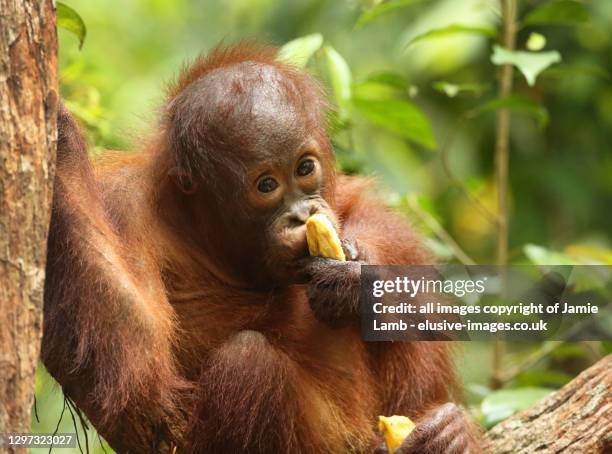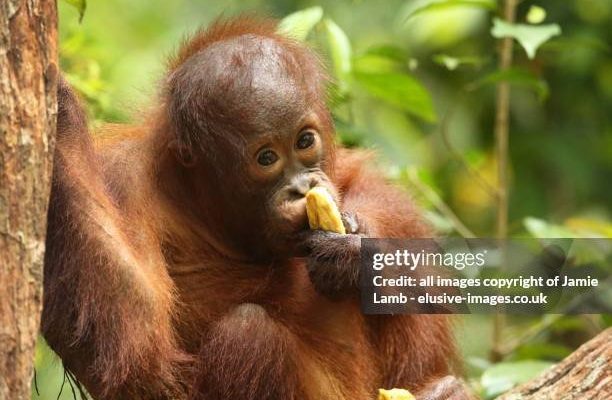
Bornean orangutans are not just foragers; they’re selective diners, carefully choosing what to munch on based on what’s available in their rainforest habitat. It’s like having a favorite restaurant menu that changes daily! Let’s dive deeper into their diet and hunting strategies to uncover what makes these apes unique not just in looks, but in lifestyle.
Understanding the Bornean Orangutan’s Diet
Bornean orangutans are omnivores, primarily feeding on fruits, leaves, and insects. Imagine a buffet filled with the juiciest fruits—this is what an orangutan experiences in their natural habitat. Their favorite food? Ripe fruits, particularly durians, mangosteen, and figs. These fruits provide them with essential nutrients and energy to roam their extensive territories.
In addition to fruits, they also munch on young leaves and the soft inner bark of trees. These foods are like side dishes in their meal plan, offering variety and vital proteins that keep them healthy. Interestingly, orangutans have developed a knack for knowing which trees are in season and will often travel miles to find their favored fruits. It’s a bit like searching for the perfect avocado at the grocery store—only with a lot more climbing!
Seasonal Changes and Food Availability
The Bornean rainforest is dynamic, and food sources can vary greatly with the seasons. During fruiting seasons, orangutans may feast on an abundance of ripe fruits, while other times, they might have to rely on tougher, fibrous leaves. This adaptability is crucial for their survival. Just think about planning a picnic—you wouldn’t pack the same food every time, right? That’s exactly how orangutans approach their meals.
They also play an essential role in their ecosystem. As they eat fruits and travel, they help spread seeds through their droppings, promoting forest growth. So, in a way, they’re nature’s gardeners, helping new plants to thrive!
Hunting Strategies of the Bornean Orangutan
While they might not hunt in the traditional sense like big cats or birds of prey, Bornean orangutans have developed unique strategies for “hunting” smaller prey, such as insects and small animals. They often use their intelligence and dexterity to catch termites or ants, much like we’d use our hands to grab snacks from a bowl.
They also utilize tools, which is pretty remarkable. Sticks can become spears when they use them to extract insects from tree crevices. Can you picture them using a twig like a chopstick to snag a tasty ant? It’s a clever adaptation that shows their cognitive skills are quite impressive.
The Role of Tools in Hunting
Tool use in orangutans isn’t just a one-off event; it’s part of their daily life. They might craft a stick to poke around in a termite mound or use a frond to catch rainwater for a sip. This behavior underscores their ability to think critically and problem-solve.
Here’s the thing: tool use isn’t just about eating; it’s a demonstration of their intelligence, which sets them apart from many other animals. It’s like having a multi-functional kitchen gadget; it makes cooking (or hunting, in this case) a whole lot easier!
Social Behavior and Foraging
Bornean orangutans are mostly solitary animals, but they do interact, especially when it comes to sharing food. When they find a good fruit tree, they might call out to other orangutans to join them in this feast. This social aspect of their foraging behavior is important for their overall survival and well-being.
Just like how we might share a pizza with friends, orangutans will often engage in a bit of socializing while they eat. They might playfully squabble over the best spots in a tree or share a particularly delicious piece of fruit. This sharing isn’t without its own drama; sometimes, one orangutan may hog a tree while others wait in anticipation.
Mother and Young: Learning to Forage
Mother orangutans play a pivotal role in teaching their young how to find food. Young orangutans often learn by watching their mothers. It’s a lot like how kids pick up skills in the kitchen by observing their parents. As these young ones grow, they imitate their mothers’ behaviors, honing their skills in foraging and tool use.
This nurturing aspect of the Bornean orangutan’s life is crucial. The more they learn, the better their chances at survival. It’s a beautiful cycle of education that passes knowledge from one generation to the next.
Nutrition and Health Implications
A balanced diet is key to the health of the Bornean orangutan. Their diet, rich in fruits and essential nutrients, helps maintain their energy levels and support their immune system. But here’s the kicker: if their food supply dwindles due to deforestation or climate change, that can pose serious health risks for orangutans.
Consider a situation where your favorite grocery store closes down. You’d have to adjust your eating habits, possibly leading to nutritional gaps. That’s what’s happening in the orangutan’s world when their natural habitat is threatened. They rely heavily on the availability of their preferred foods to thrive.
Conservation Efforts
Recognizing the importance of orangutans in their ecosystem, numerous conservation efforts are underway to protect their habitats from destruction. Organizations work tirelessly to restore forest areas, promote sustainable practices, and educate local communities about the significance of these incredible apes.
By preserving their environment, not only do we help orangutans, but we also support the larger ecosystem that depends on them. It’s a win-win situation for the planet—like keeping a community garden thriving by ensuring everyone has a hand in its upkeep.
The diet and hunting strategies of the Bornean orangutan offer a window into their fascinating world. These remarkable creatures are not just foragers; they’re intelligent, adaptable beings who play a vital role in their ecosystem. From their love for fruit-based meals to their clever use of tools, orangutans teach us about the delicate balance of nature.
In a world where their habitats are increasingly threatened, understanding and supporting their dietary needs becomes essential. Protecting these majestic animals ensures that their unique way of life continues, fostering biodiversity and enriching our planet. So, the next time you think of the Bornean orangutan, remember that there’s more than meets the eye—a complex eater and an intelligent hunter navigating the lush tapestry of their world.

